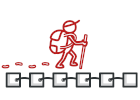
Iterator を C# で
Iterator は、 振る舞いに関するデザインパターンの一つで、 複雑なデータ構造の内部の詳細を公開することなく、 順次横断的に探索することを可能とします。
Iterator のおかげで、 クライアントは、 異なるコレクション上の要素の探索を、 単一のイテレーター・インターフェースを使用して同様の方法で行えます。
複雑度:
人気度:
使用例: このパターンは、 C# コードではよく見かけます。 多くのフレームワークやライブラリーがこれを使用してコレクション上の探索の標準的方法を提供します。
見つけ方: Iterator は、 next や previous などの操舵用メソッドの存在から簡単に識別できます。 イテレーターを使ったクライアント・コードには、 探索対象のコレクションへの直接のアクセスがないかもしれません。
概念的な例
この例は、 Iterator デザインパターンの構造を説明するためのものです。 以下の質問に答えることを目的としています:
- どういうクラスからできているか?
- それぞれのクラスの役割は?
- パターンの要素同士はどう関係しているのか?
Program.cs: 概念的な例
using System;
using System.Collections;
using System.Collections.Generic;
namespace RefactoringGuru.DesignPatterns.Iterator.Conceptual
{
abstract class Iterator : IEnumerator
{
object IEnumerator.Current => Current();
// Returns the key of the current element
public abstract int Key();
// Returns the current element
public abstract object Current();
// Move forward to next element
public abstract bool MoveNext();
// Rewinds the Iterator to the first element
public abstract void Reset();
}
abstract class IteratorAggregate : IEnumerable
{
// Returns an Iterator or another IteratorAggregate for the implementing
// object.
public abstract IEnumerator GetEnumerator();
}
// Concrete Iterators implement various traversal algorithms. These classes
// store the current traversal position at all times.
class AlphabeticalOrderIterator : Iterator
{
private WordsCollection _collection;
// Stores the current traversal position. An iterator may have a lot of
// other fields for storing iteration state, especially when it is
// supposed to work with a particular kind of collection.
private int _position = -1;
private bool _reverse = false;
public AlphabeticalOrderIterator(WordsCollection collection, bool reverse = false)
{
this._collection = collection;
this._reverse = reverse;
if (reverse)
{
this._position = collection.getItems().Count;
}
}
public override object Current()
{
return this._collection.getItems()[_position];
}
public override int Key()
{
return this._position;
}
public override bool MoveNext()
{
int updatedPosition = this._position + (this._reverse ? -1 : 1);
if (updatedPosition >= 0 && updatedPosition < this._collection.getItems().Count)
{
this._position = updatedPosition;
return true;
}
else
{
return false;
}
}
public override void Reset()
{
this._position = this._reverse ? this._collection.getItems().Count - 1 : 0;
}
}
// Concrete Collections provide one or several methods for retrieving fresh
// iterator instances, compatible with the collection class.
class WordsCollection : IteratorAggregate
{
List<string> _collection = new List<string>();
bool _direction = false;
public void ReverseDirection()
{
_direction = !_direction;
}
public List<string> getItems()
{
return _collection;
}
public void AddItem(string item)
{
this._collection.Add(item);
}
public override IEnumerator GetEnumerator()
{
return new AlphabeticalOrderIterator(this, _direction);
}
}
class Program
{
static void Main(string[] args)
{
// The client code may or may not know about the Concrete Iterator
// or Collection classes, depending on the level of indirection you
// want to keep in your program.
var collection = new WordsCollection();
collection.AddItem("First");
collection.AddItem("Second");
collection.AddItem("Third");
Console.WriteLine("Straight traversal:");
foreach (var element in collection)
{
Console.WriteLine(element);
}
Console.WriteLine("\nReverse traversal:");
collection.ReverseDirection();
foreach (var element in collection)
{
Console.WriteLine(element);
}
}
}
}
Output.txt: 実行結果
Straight traversal:
First
Second
Third
Reverse traversal:
Third
Second
First